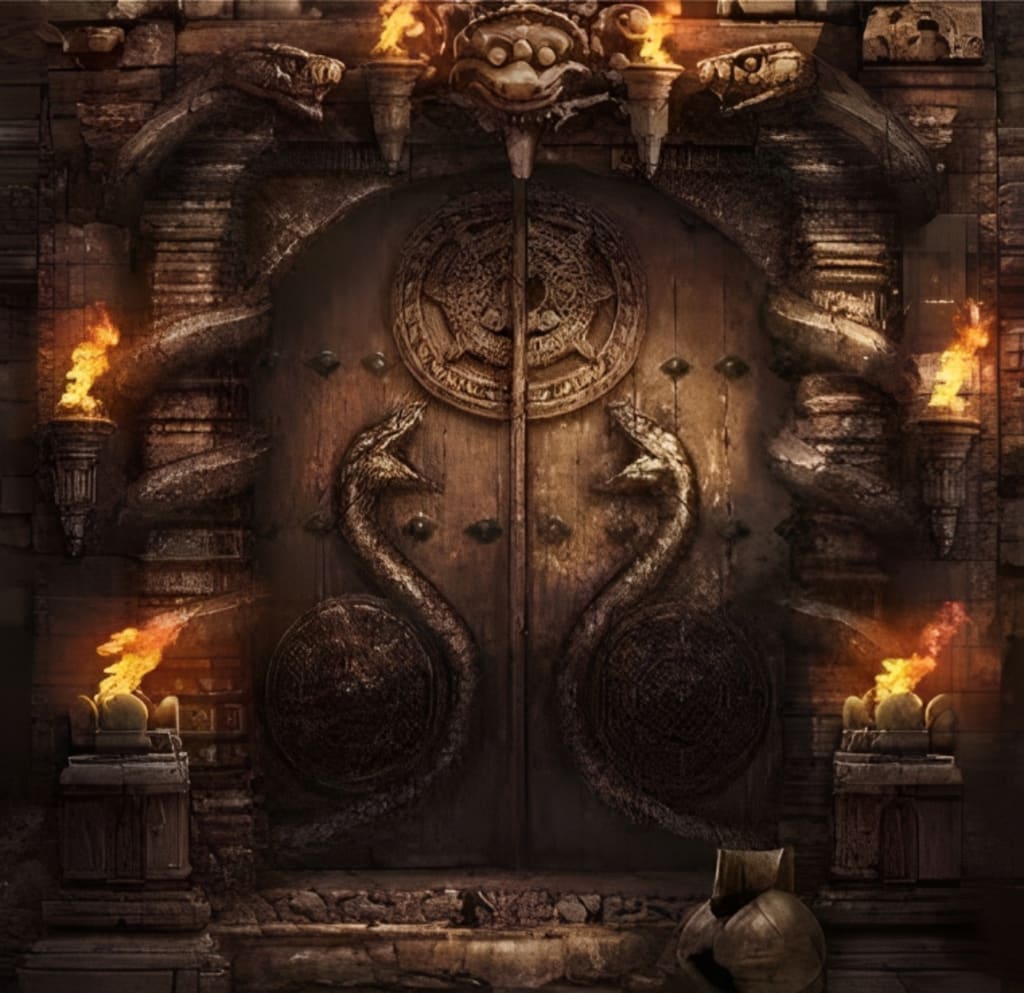The Veiled Secrets: Decoding the Seventh Door of Anantha Padmanabha Swamy Temple(Part-2)
Unearthing Legends, Controversies, and Ethical Dilemmas of a Timeless Enigma

Introduction
Nestled in the historic city of Thiruvananthapuram, Kerala, India, the Anantha Padmanabha Swamy Temple has long been a center of spiritual devotion and intrigue. This ancient temple, dedicated to Lord Padmanabha, is renowned not only for its rich history but also for the enigmatic secrets it holds. Among these mysteries, none is more captivating than the story of the Seventh Door, a legendary chamber that has remained sealed for centuries. In this article, we will delve deep into the mysteries surrounding the Seventh Door, exploring the legends, controversies, and the relentless quest to unveil its secrets.
The Temple and Its Sacred Vault
The Anantha Padmanabha Swamy Temple, an architectural marvel, is a sacred haven where devotees come to seek solace and connect with the divine. Lord Padmanabha, a form of Lord Vishnu, reclines on the cosmic serpent, Anantha, in the sanctum sanctorum. This unique depiction is the focal point of the temple's spirituality and allure.
Beneath the temple's hallowed precincts, there are six secret vaults (lettered from A to F), each shrouded in myth and mystery. These vaults have remained sealed for centuries, and it is Vault B, the so-called Kallara, that contains the Seventh Door, a subject of fascination and speculation.
The Legend of the Seventh Door
The legend of the Seventh Door is intertwined with the temple's history and the fervent belief that it guards untold riches and ancient relics. It is said that the door has remained unopened for countless generations, and only a spiritually elevated soul with divine authority can unlock its secrets.
The belief in the Seventh Door's immense wealth is rooted in the temple's history. Over centuries, kings, nobles, and devotees offered their wealth, including gold, jewels, and treasures, as offerings to Lord Padmanabha. These offerings were believed to be stored within the temple's vaults, with Vault B at the center of attention.
The Controversy Surrounding the Seventh Door
The controversy surrounding the Seventh Door began to gain momentum in the early 2010s when a petition was filed in the Kerala High Court, seeking to open the vaults and assess the temple's treasures. The petition was driven by concerns about the security and management of the wealth contained within the temple, as well as the desire to preserve the temple's spiritual sanctity.
The court appointed a committee to assess the contents of the vaults, leading to the unearthing of unimaginable wealth in the form of gold, jewelry, and precious stones. While this discovery was awe-inspiring, the focus soon shifted to the Seventh Door, believed to hold the most priceless treasures of all.
However, attempts to open the Seventh Door were met with resistance from the temple's authorities and devotees. It was argued that the door should only be unlocked by a spiritually enlightened sage, and any attempt to force it open would bring divine wrath upon the temple and its surroundings.
The Ethical Dilemma
The controversy surrounding the Seventh Door poses complex ethical dilemmas. On one hand, there is a desire to preserve and protect the temple's spiritual sanctity and cultural heritage. On the other hand, there are questions about the responsibility of the temple's trustees and authorities in managing the vast wealth accumulated over centuries.
The immense wealth within the temple has sparked debates about its rightful ownership and potential contributions to the local community. Some argue that the wealth should be used for charitable purposes, while others stress the importance of maintaining the temple's traditions and spiritual significance.
The Future of the Seventh Door
As of the knowledge cutoff date in September 2021, the Seventh Door remains sealed, and the mysteries it guards continue to tantalize the world. The debate over whether to open the door rages on, with various stakeholders offering differing viewpoints. The Kerala High Court has taken measures to ensure the proper management and protection of the temple's wealth, but the ultimate fate of the Seventh Door remains uncertain.
Conclusion
The Seventh Door of the Anantha Padmanabha Swamy Temple represents a unique blend of spirituality, legend, and controversy. It stands as a symbol of the enduring mysteries that captivate human imagination and spark debates about cultural heritage, spirituality, and ethics.
The temple itself, with its awe-inspiring architecture and profound spiritual significance, remains a place of devotion and pilgrimage for countless people. Whether the Seventh Door will ever be opened, and the secrets it holds unveiled, remains a question that time and destiny alone can answer.
In the meantime, the Anantha Padmanabha Swamy Temple continues to draw pilgrims and seekers of the divine, offering a glimpse into the rich tapestry of India's cultural and spiritual heritage, as well as the enduring allure of the unknown.
About the Creator
Harika Vaddi
Exploring various topics through writing.





Comments
There are no comments for this story
Be the first to respond and start the conversation.